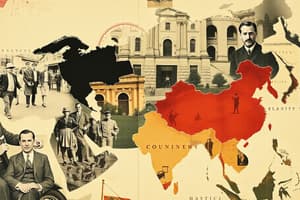Podcast
Questions and Answers
What is a state?
What is a state?
- A political unit with defined territorial boundaries (correct)
- A group of people who share a common culture
- An area with undefined territorial boundaries
- A group of people without a sovereign state of their own
What is the difference between a state and a nation?
What is the difference between a state and a nation?
- States are defined by their geographical boundaries, while nations are defined by their cultural identity. (correct)
- Nations are political units with defined territorial boundaries.
- There is no difference between a state and a nation.
- States are groups of people who share a common culture, language, history, and/or identity.
What is a city-state?
What is a city-state?
- A group of people who share a common culture
- A state composed of multiple nations
- A state whose population is predominantly composed of a single nation
- A sovereign state consisting of a city and its surrounding territory (correct)
What is a city-state?
What is a city-state?
What is self-determination?
What is self-determination?
What is self-determination?
What is self-determination?
What are multinational states?
What are multinational states?
What are multinational states?
What are multinational states?
What led to the creation of new states and the redrawing of boundaries?
What led to the creation of new states and the redrawing of boundaries?
What led to the creation of new states and the redrawing of boundaries?
What led to the creation of new states and the redrawing of boundaries?
Flashcards are hidden until you start studying
Study Notes
- States are political units with defined territorial boundaries.
- Nations are groups of people who share a common culture, language, history, and/or identity.
- Nation-states are states whose population is predominantly composed of a single nation.
- City-states are sovereign states consisting of a city and its surrounding territory.
- Stateless-nations are nations without a sovereign state of their own.
- Multinational states are states composed of multiple nations.
- Sovereignty is the supreme authority of a state to govern itself and its territory without external interference.
- Self-determination is the right of a people to determine their own political status and pursue their own economic, social, and cultural development.
- Imperialism and colonialism led to the creation of new states and the redrawing of boundaries.
- Yugoslavia was a state composed of multiple ethnic groups, dissolved in 1991.
Studying That Suits You
Use AI to generate personalized quizzes and flashcards to suit your learning preferences.




